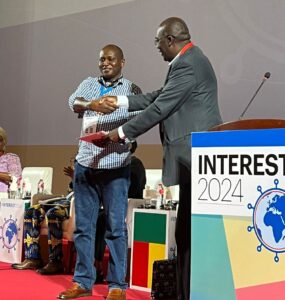Imagine a world where the buzzing of mosquitoes no longer signals the threat of malaria. This isn’t a far-off dream, it’s a vision coming to life in Africa. Despite the strides we’ve made, this ancient disease still lurks in our communities, preying on our most vulnerable, our children.
In 2022, the world witnessed 249 million cases of malaria according to WHO’s estimates, with a staggering 608,000 lives lost. This number exceeded the estimated cases before the COVID-19 pandemic marking an increase of five million over 2021. Africa, especially our children under five, suffered the worst of this damage. Despite our efforts with nets and sprays, these tools are not bearing desirable fruits. We need more than just a new tool—we need a revolution.
Enter the realm of biocontrol technologies, our new allies in the malaria fight. These aren’t everyday solutions. They’re cutting-edge technologies tailored to our African needs. Picture mosquitoes, the very carriers of malaria, turned into our unwitting protectors. Through Gene Drive Modified Mosquitoes (GDMMs) we are on the brink of turning the tide. GDMMs are not typical mosquitoes. They are engineered to be poor hosts for malaria, carrying a gene that spreads this trait like wildfire through their populations. The result? A reduction in the number of mosquitoes that can transmit the disease. We are exploring two paths: wiping out the mosquito species that plague us or disarming them so they can’t spread malaria. The obstacle? Many people get scared at the mere mention of genetically modified organisms.
At Ifakara Health Institute, we’re not just in the lab, —we’re in the field, listening to the heartbeat of Africa. In 2020, we conducted a study to explore the opinions of key stakeholders on the national progress towards malaria elimination, the potential of current vector control interventions, and the need for alternative interventions to supplement malaria elimination efforts in Tanzania. We engaged a wide range of stakeholders: policy-makers, regulators, research scientists, and community members, to ensure these biocontrol methods are not only safe and effective but also embraced wholeheartedly.
Our research revealed that techniques of mosquito modification, specifically those involving gene drives, were viewed positively by community members, policy-makers, and regulators but encountered a high degree of skepticism among scientists. Overall, policy-makers, regulators, and community members trusted scientists to provide appropriate advice for decision-making.
The fight against malaria is entering a new era and Africa is at the forefront of biocontrol technologies. It’s more than just science; it’s our collective will to protect our future. Together, we’re not merely controlling malaria; we’re reclaiming our health and our aspirations.
Incorporating the views and recommendations of African stakeholders in the ongoing research and development of GDMMs is crucial. This was highlighted in a follow up study that we conducted to explore the insights and recommendations of key stakeholders across Africa on the potential of GDMMs for malaria control and elimination on the continent. We are raising awareness, bolstering our homegrown expertise, and ensuring these breakthroughs are firmly rooted in Africa.
Marceline Finda (cohort 7, University of the Witwatersrand) is a Research Scientist and a deputy head of the department of Environmental Health and Ecological Sciences at Ifakara Health Institute in Tanzania





No Comments